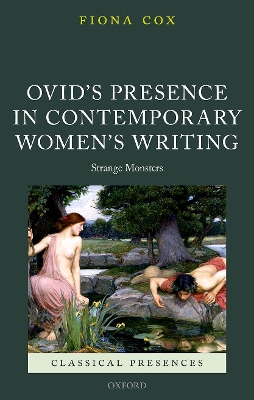Classical Presences
2 total works
The history of Virgil and his receptions is long and varied. His twentieth-century career transformed his appearance as an anaemic imitator of Homer into the 'Father of the West', speaking above all for the marginalized and exiled. At the turn of the millennium it is women writers who, having been largely absent from the story of Virgil's reception, are for the first time shaping a new aetas Vergiliana by drawing on his poems to speak of their own
preoccupations and concerns. Through an analysis of Virgil's presence in the work of contemporary women writers from North America (Joyce Carol Oates, Janet Lembke, Ursula Le Guin), Britain (Margaret Drabble, A. S. Byatt, Ruth Fainlight, Michele Roberts, Carol Ann Duffy, U. A. Fanthorpe, Josephine Balmer), Ireland
(Eavan Boland), and continental Europe (Christa Wolf, Helene Cixous, Charlotte Delbo and Monique Wittig), this book identifies a new Virgil: one who speaks in female tones of the anxieties, exclusions, pleasures, and threats of the contemporary world. While each of the female writers included in this volume draws upon her own distinct cultural heritage, Cox focuses on a number of shared themes and values which emerge through their work.
Through the works of these modern versions of the Sibyl, Virgil speaks both of explicitly female concerns and wider cultural issues and threats that shadow modern life.
preoccupations and concerns. Through an analysis of Virgil's presence in the work of contemporary women writers from North America (Joyce Carol Oates, Janet Lembke, Ursula Le Guin), Britain (Margaret Drabble, A. S. Byatt, Ruth Fainlight, Michele Roberts, Carol Ann Duffy, U. A. Fanthorpe, Josephine Balmer), Ireland
(Eavan Boland), and continental Europe (Christa Wolf, Helene Cixous, Charlotte Delbo and Monique Wittig), this book identifies a new Virgil: one who speaks in female tones of the anxieties, exclusions, pleasures, and threats of the contemporary world. While each of the female writers included in this volume draws upon her own distinct cultural heritage, Cox focuses on a number of shared themes and values which emerge through their work.
Through the works of these modern versions of the Sibyl, Virgil speaks both of explicitly female concerns and wider cultural issues and threats that shadow modern life.
This innovative study analyses the presence of Ovid in contemporary women's writing through a series of insightful case studies of prominent female authors, from Ali Smith, Marina Warner, and Marie Darrieussecq, to Alice Oswald, Saviana Stanescu, and Yoko Tawada. Using Ovid in their engagements with a wide range of issues besetting our twenty-first century world - homelessness, refugees, the financial crisis, internet porn, anorexia, body image - these writers
echo the poet's preoccupation in his own work with fleeting fame, shape-shifting, and the dangers of immediate gratification, and make evident that these concerns are not only quintessentially modern, but also peculiarly Ovidian. Moving beyond the concern of second-wave feminism with recovering silenced
female voices and establishing a female perspective within canonical works, the volume places particular emphasis on the intersections between Ovid's imaginative universe and the political and aesthetic agenda of third-wave feminism. Focusing on its subjects' socially and politically charged re-shapings, re-imaginings, and receptions of Ovid, it not only demonstrates the extraordinary plasticity of his writing, but also of its myriad re-castings and re-contextualizations within contemporary
culture (in terms of genre alone, the works discussed included translations, poetry, plays, novels, short stories, and memoirs). In so doing, it not only offers us a valuable perspective on the work of the selected female authors and a new and vital landmark in the history of Ovidian reception, but also
reveals to us an Ovid who remains our contemporary and an enduring source of inspiration.
echo the poet's preoccupation in his own work with fleeting fame, shape-shifting, and the dangers of immediate gratification, and make evident that these concerns are not only quintessentially modern, but also peculiarly Ovidian. Moving beyond the concern of second-wave feminism with recovering silenced
female voices and establishing a female perspective within canonical works, the volume places particular emphasis on the intersections between Ovid's imaginative universe and the political and aesthetic agenda of third-wave feminism. Focusing on its subjects' socially and politically charged re-shapings, re-imaginings, and receptions of Ovid, it not only demonstrates the extraordinary plasticity of his writing, but also of its myriad re-castings and re-contextualizations within contemporary
culture (in terms of genre alone, the works discussed included translations, poetry, plays, novels, short stories, and memoirs). In so doing, it not only offers us a valuable perspective on the work of the selected female authors and a new and vital landmark in the history of Ovidian reception, but also
reveals to us an Ovid who remains our contemporary and an enduring source of inspiration.

